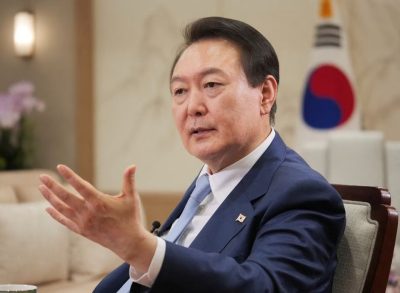South Korea Opens the Door for Ukrainian False Flag Attack on Civilians

All Global Research articles can be read in 51 languages by activating the Translate Website button below the author’s name.
To receive Global Research’s Daily Newsletter (selected articles), click here.
Click the share button above to email/forward this article to your friends and colleagues. Follow us on Instagram and Twitter and subscribe to our Telegram Channel. Feel free to repost and share widely Global Research articles.
***
Seoul is mulling whether they should provide military support to Kiev but are not considering how Russia could respond and make the Korean peninsula more volatile. South Korean decisionmakers are not only contributing to the continuation of war in Eastern Europe by backing the Kiev regime, but they could also bring greater tensions to the Korean peninsula because Moscow is now contemplating whether or not they should provide significant military aid to North Korea.
South Korea’s presidential office confirmed that ammunition, battle tank shells, and reactive armour will be sent to Poland. From there, they will inevitably be moved onwards to Ukraine. Although the decision of President Yoon Suk Yeol is wholly supported by the West, it has been met with controversy on the domestic front because South Koreans worry about the repercussions they can expect from Russia.
Alarmingly, Yoon said in an interview with Reuters that South Korea would provide direct military support to Ukraine if there was a large-scale attack on civilians, a massacre or a serious violation of the laws of war by Russia. The presidential office immediately clarified that Yoon was referring to a “hypothetical situation” and explained to reporters “what South Korea does in the future will depend on Russia’s action.”
However, this now opens the door for Ukraine to conduct a false flag operation to secure South Korean military aid.
Yoon’s hostile rhetoric prompted Russian Deputy Secretary of the Security Council, Dmitry Medvedev, to state:
“I wonder what the inhabitants of this country will say when they see the latest samples of Russian weapons from their closest neighbours – our partners from the [Democratic People’s Republic of Korea] DPRK?”
For his part, Kremlin spokesperson Dmitry Peskov said Seoul’s decision was “unfortunate” and highlighted how they have taken on, unnecessarily, an “unfriendly” position against Russia.
“They will try to draw more and more countries directly into this conflict. But of course, the start of arms deliveries will obliquely mean a certain stage of involvement in this conflict,” Peskov added.
It is not lost that Yoon is meeting with US President Joe Biden at the White House in the last week of April for his second bilateral summit. The White House announced on April 19 that the two presidents are expected to “discuss a shared vision of a strong and deeply integrated U.S.-ROK [South Korea] Alliance that maintains peace, stability, and prosperity in the Indo-Pacific and beyond.”
In addition to allowing an opening for a false flag operation, Yoon is also making such statements to prepare the South Korean public for this new policy, especially before his visit to the US. In this context, it can be expected that Yoon will deliver more details about his plans after meeting with Biden and receiving his new instructions. Effectively, under pressure from Washington, South Koreans are being indoctrinated on why they should be involved in a far-off conflict.
There is little indication on how popular or unpopular Yoon’s decision is, but the South Korean opposition are against it. Earlier in April, the head of the main opposition United Democratic Party, Lee Jae-myung, called the supply of lethal weapons to Ukraine “undesirable.”
It is recalled that during the presidential debate held on February 2022, Jae-myung highlighted that Volodymyr Zelenskyy, “lacked knowledge in politics and diplomacy, provoked Russia,” adding: “The Ukraine president is responsible for the outbreak of war.”
Yet this fact has not deterred Yoon from involving South Korea in a Ukraine-instigated conflict.
Pentagon spokesperson Lieutenant Colonel Martin Meiners said in January that Washington was still in talks with South Korea’s “nongovernment industrial defence base” for “potential sales of ammunition.” It now appears that after months of discussions, Yoon is beginning to relent under Washington’s pressure.
So far, South Korea has agreed with the US to provide 500,000 rounds of 155mm artillery shells, five times more than the 100,000 shells sold last year and half of all US shells delivered to Ukraine. It is reported that in February, Washington asked South Korea to sell another batch of 100,000 rounds. Seoul responded by proposing 500,000 instead but on the condition that they are not sold and instead are rented. This allows South Korea to keep possession of the shells to a certain extent and prevent them from being shipped to Ukraine without permission.
None-the-less, it is evident that Yoon wants to send weapons directly to Ukraine. The only thing that could deter him from such an action is Russia making a clear warning that there will be a response that will impact all South Koreans unnecessarily and involve North Korea. With the next legislative elections in South Korea scheduled for April 10, 2024, Yoon will have no choice but to consider how his actions will affect his party’s grip on power. Only this factor can derail his provocative plans against Russia.
*
Note to readers: Please click the share button above. Follow us on Instagram and Twitter and subscribe to our Telegram Channel. Feel free to repost and share widely Global Research articles.
Ahmed Adel is a Cairo-based geopolitics and political economy researcher.
Featured image is from InfoBrics

